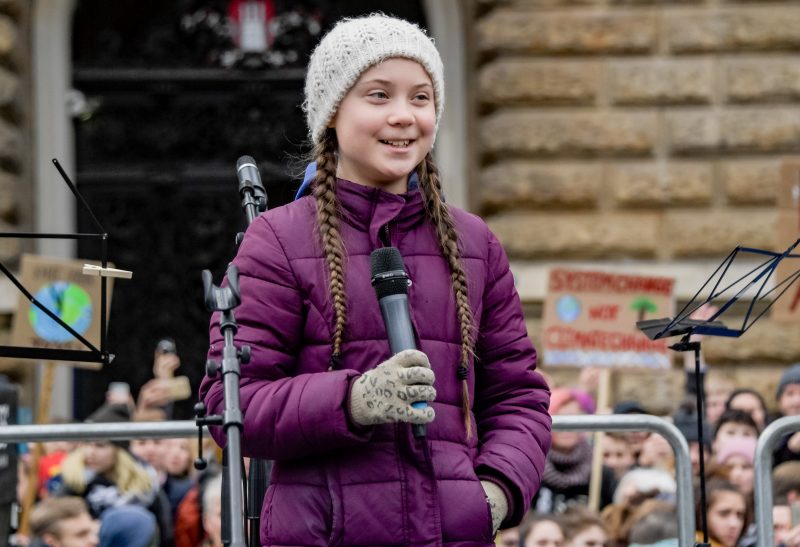Global youth climate strike could be ‘milestone’ moment
Swedish climate activist Greta Thunberg in Germany earlier this month at a demonstration calling for urgent action on climate change (Axel Heimken)
Paris (AFP) – It began with a solitary, 15-year-old girl camped out in front of Sweden’s parliament next to a hand-written sign: “SCHOOL STRIKE FOR CLIMATE”.
Barely six months later, Friday’s youth-led strike — promising 1,000 actions spread over 100 countries — could be a “milestone moment” in a grassroots campaign to goad world leaders into confronting the threat of global warming, activists and experts say.
“We are only seeing the beginning,” tweeted Greta Thunberg, who has turned 16.
“I think that change is on the horizon and the people will stand up for their future.”
So far, the weekly walk-outs have seen tens of thousands of mostly high school students spill out into the streets in Germany, Belgium, Britain and France, with a smattering of actions in half-a-dozen other countries.
But on March 15, classrooms are set to empty in cities across the globe, from Boston to Bogota, Montreal to Melbourne, Dhaka to Durban, Lagos to London.
Some local and national leaders have tried to cajole or threaten students, but such efforts have mostly backfired.
In Australia, when New South Wales Education Minister said those ditching classes would be punished, Greta — as she is known to all — responded in a tweet: “We hear you, and we don’t care. Your statement belongs in a museum.”
Climate change impacts vary from one region to the next, but teens everywhere confronted with a climate-addled future have decided where to direct their ire.
“Dear adults, use your power!”, has become an unofficial slogan for the #FridaysForFuture movement.
– Wakeup call –
In France, the message scrawled on posters in the street is more pointed: “In 2050 you will be dead, not us.”
The crescendo of impatience expressed by youth toward their elders is not hard to understand.
Despite 30 years of warnings about dire impacts, carbon dioxide (CO2) emissions hit record levels in 2017 and again last year. Loading the atmosphere with greenhouse gases at current rates, scientists agree, will eventually lead to an unliveable hothouse planet.
The problem, in other words, continues to outstrip efforts to rein it in.
“On climate change, we have to acknowledge that we have failed,” Greta, an invited speaker, told the global ruling class in Davos in January.
The 2015 Paris climate treaty calls for capping global warming at “well below” two degrees Celsius (3.6 degrees Fahrenheit).
The planet is currently on track to heat up by at least 4C.
In an electro-shock report published in October, the UN’s climate science panel (IPCC) said only a wholesale transformation of the global economy and consumer habits could forestall climate catastrophe.
“That was definitely a wake-up call for us,” said Stephen O’Hanlon, spokesman for the youth-led Sunrise Movement in the United States, where schools strikes and protests are expected in a number of big cities.
Along with other groups that have sprung up in the last six months, including the Extinction Rebellion in Britain, a new generation of climate activists has adopted a long-haul strategy of civil disobedience.
– Tomorrow’s voters –
“We are the last generation to have a realistic chance to prevent a climate catastrophe,” said Global Strike for the Future spokesperson Linus Steinmetz.
“If adults won’t comply with the rules, we won’t either.”
Young people have also sued governments in Europe and the United States for failing to adopt policies that protect citizens from stronger storms, heatwaves and flooding that scientists say are already underway.
“Change always happens when ordinary people take extraordinary actions — this is one of those moments,” said Nicolas Haeringer, global organiser for 350.org, a grassroots climate NGO founded in 2007.
“This next global strike will be a milestone in world history, a moment when adults will learn to follow the lead of children.”
Experts on social movements were more measured but agreed that the world is seeing something new.
“What has impressed me is how qualitatively different the recent upsurge in grassroots activism feels — not just in volume, but in the radical form it’s taking,” said Doug McAdams, a professor of sociology at Stanford University who recently wrote a study to explain the lack of climate change activism in the United States.
Global warming, he now predicts, will emerge as a key issue in the 2020 presidential and congressional elections.
“The fact that this is led by the younger generations changes the political landscape,” said Sebastien Treyer, director general of the Institute for Sustainable Development and International Relations in Paris.
“They are tomorrow’s voters.”
Disclaimer: This story is published from a syndicated feed. Siliconeer does not assume any liability for the above story. Validity of the above story is for 7 Days from original date of publishing. Content copyright AFP.


